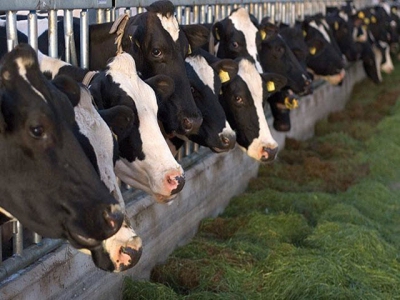Precision dairy rationing tools improve milk production, profits
Maximizing nutrition in early lactation dairy diets can have long-lasting positive effects on production, fertility
 Forage analysis crucial to accurate ruminant rations
Forage analysis crucial to accurate ruminant rations NIR analysis aids in combating variability, identifying accurate nutrient, mineral parameters
 How nutrition influences dairy cow health, immunity
How nutrition influences dairy cow health, immunity Balanced nutrition greatly affects immune function, performance in transition cows
 Feeding diseased livestock remains a challenge
Feeding diseased livestock remains a challenge Nutrient requirements for fighting disease are quite different from those required for productive purposes.
 Eating less meat won't move climate change needle
Eating less meat won't move climate change needle Science also can make livestock more productive and environmentally friendly.
 Almond industry feed targeted research looks to dairy and beyond
Almond industry feed targeted research looks to dairy and beyond Almond producers in California are exploring the possibility of using almond hulls as feedstock for black solider flies, among other areas.
 Chromium use in transition cows
Chromium use in transition cows Trace minerals have critical roles in the immune function and cell metabolism in ruminants. For cows in transition or during early lactation
 "Farmers often miss the mildly lame cows"
"Farmers often miss the mildly lame cows" When it comes to effectively managing lameness in dairy and beef cattle, there is no magic bullet.
 How to optimise dairy replacement?
How to optimise dairy replacement? It starts with the calves; it always has. But we seem to be lacking in raising those calves to become excellent replacement heifers
 Heat stress: an increasing risk for European cows
Heat stress: an increasing risk for European cows As climate change becomes an omnipresent issue in global agriculture, heat stress in Europe will become an increasing issue in, not only the usual areas
 Understanding cattle breeding better
Understanding cattle breeding better Conventional breeding techniques for more milk production may be obvious. However, not so much is known about the underlying genetics
 Optimal conditions for modern day dairy cows
Optimal conditions for modern day dairy cows Intensive dairy farming demands very much from modern day dairy cows. Genetic improvement resulted in higher yield capacity and on average larger cows
 Optimal ruminant performance during exposure to mycotoxins
Optimal ruminant performance during exposure to mycotoxins Healthy reproduction status, organ functioning and milk production levels are important aspects in optimal performing ruminants
 Transponders monitor cow activity to support lameness management
Transponders monitor cow activity to support lameness management Lameness has an impact on milk production, welfare and herd profitability. It is a serious problem in many dairy herds worldwide
 Cow's high selenium diets may boost protein transfer to calves
Cow's high selenium diets may boost protein transfer to calves Supplementing pregnant cow diets with levels of selenium could improve the passive transfer of immunoglobulin to calves, say researchers.
 Genes identified that could lead to beef cattle improvement
Genes identified that could lead to beef cattle improvement Researchers in Brazil identify 35 genes associated with reproduction, milk composition, growth, meat, carcass, health and body conformation traits in Gir cattle
 Managing heat in the desert
Managing heat in the desert Dairy cows need optimal conditions to be productive. Warm climates like in the Middle East, do not contribute to achieving the goal
 After decades of mastitis research, there are still a lot of unknowns
After decades of mastitis research, there are still a lot of unknowns Despite years of research on mastitis and udder health, there are still many facets that need further exploration in order to get to grips with the disease.
 Live yeast supplements may boost cow pregnancy rates in hot weather
Live yeast supplements may boost cow pregnancy rates in hot weather Supplementing the diets of dairy cows facing heat stress conditions with a live yeast additive may shorten the time to estrus and improve cow fertility
 Advancements in technology may lead to improved rumen function, fiber digestion
Advancements in technology may lead to improved rumen function, fiber digestion New technology could unlock additional nutrition from fibrous feed ingredients, as improvements in understanding the ruminal microbiome show potential paths
